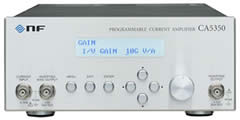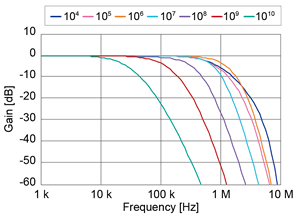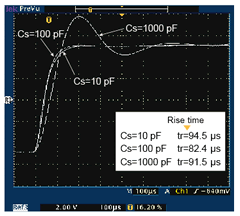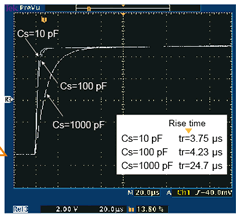

 |
High Gain
and Broad
Bandwidth |
 |
|
|
 |
| The CA5350 realizes
unprecedented high gain and broad bandwidth support from
DC to 14 kHz at 1010 V/A, and from DC to 70
kHz at 109 V/A. In addition, it also supports
high-speed signals from DC to 500 kHz at 106
V/A or less.. |
Gain-frequency characteristics
|
 |
 |
Variable
Gain 104
to 1011
suV/A |
 |
|
|
 |
Gain can be set in seven ranges
of 104, 105, 106,
107, 108, 109,
1010 (V/A), in x10 increments.
This enables the optimal gain setting to match the
current and sensor values that vary depending on the
measurement conditions.
In addition, if an output amplifier gain of x10 is used,
a maximum gain setting of 1011 V/A is
possible. |
 |
Fast
Response and Stable
Operation |
 |
|
|
 |
The fast response of
0.7 μs at 106 V/A gain enables support for
fast pulse response signal processing in optical
systems.
Our unique circuit design technology enables stable
operations even with the capacitance of the connecting
cables and sensors, eliminating any concerns about
oscillation.
In addition, overshoot and ringing do not occur even for
pulse responses.
By achieving both fast response and broad bandwidth, as
well as stable operation even with additional
capacitance on the input side, the CA5350 supports a
variety of sensor types. |
 |
|
Pulse response characteristics (Gain:
109 V/A)
|

|
 |
| Conventional
Current Amplifier |
CA5350
|
| (X-axis: 100 μs/div., Y-axis: 2
V/div.) |
(X-axis: 20 μs/div., Y-axis: 2
V/div.) |
| |
 |
 |
Current
Suppression |
 |
|
|
 |
For
photodiodes and photo transistors, in the absence
of incident light, a weak current called a dark current
will flow.
In a current amplifier with high gain, a small DC
current input becomes a large voltage when output, and
the amplifier is saturated and measurement becomes
impossible.
The built-in suppression current source is adjustable to
cancel the input of such dark current.
The current suppression setting can be selected in six
ranges from ±8 nA to ±800 μA.
In addition, the auto-suppression function can be used
to automatically set the range and current value
required to suppress the dark current.
|
Current suppression setting screen |
 |
 |
Low
Noise |
 |
|
|
 |
Built-in filters
and DC power supply
The CA5350 achieves an ultra-low noise with an
input-referred noise of 2.5 fA/√Hz (at
1010 V/A, 55 Hz).
In addition, in order to remove noise components and to
improve the signal-to-noise ratio (SN ratio), the
built-in filter can be set to a response speed in the
range of 1 μs to 300 ms to optimize the SN ratio and
response speed depending on the application.
And furthermore, in our pursuit of the low noise
operation that is essential to the amplification of a
weak current, we have adopted a low noise DC power
supply in the power supply section using our own unique
technology. |
Filter response speed (rise time)
setting screen |
 |
 |
Built-in
System Features
|
 |
|
|
 |
Interfaces, input and output
terminals
The standard-equipped USB and GPIB interfaces
support remote control and integration of the CA5350
into an automatic measurement system.
Since input and output terminals are provided on both
the front and rear panels, you can choose the terminals
depending on how you are connecting to sensors or other
equipment.
In addition, the half-rack size makes the integration of
multiple units easy. |
 |
|
 |
Other
Functions |
 |
|
|
|
|
 |
|
|
|
|